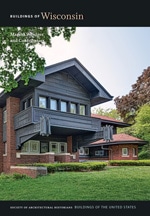
The Prairie Style Fugina House seems to grow from a wooded hill overlooking the Mississippi River. The two-story house is perhaps Bentley’s most important work designed on his own. In plan, it forms a cross. A one-story polygonal sunroom projects near the north end of the main facade, and its flat roof with deep soffits continues onward to cover a small entrance pavilion in an angle of the cross. The house’s emphatic horizontality comes from its wide eaves edged with rough-sawn cedar, long wooden sills trimming ribbons of windows, and a rectangular second-story balcony cantilevered from the north facade. The walls are built of long, flat Roman bricks with flush vertical mortar joints but deeply raked horizontal ones, as seen in houses by Frank Lloyd Wright. Bentley installed geometric art glass in the windows, dangled geometric pendants from the soffits, and hung copper screens in the south-facing porch. Wright’s influence is apparent throughout the house, especially inside. A long living-dining room spans the entire first floor, light pouring in through windows on three sides. An enormous fireplace of yellowish Roman brick dominates the room, recalling Wright’s maxim that placed the hearth at the center of family life. Clear-finished wooden banding runs eighteen inches below the ceiling in most rooms, conveying a human scale.

